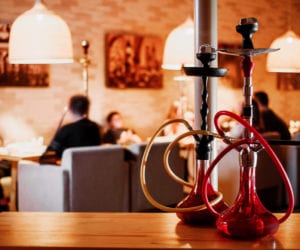The Negative Side Effects of Smoking Hookah

A Trend That Has Health Consequences
Many people assume that smoking hookah is a ‘healthier’ alternative to smoking cigarettes, cigars, or marijuana. The reality is that smoking Hookah poses a risk for health consequences and can be a gateway to the world of substance abuse. A recent study has discovered that nearly one in five high school seniors have tried hookah or use hookah on a regular basis. Beginning to use substances during a time of vital brain development, such as during the teen years, can have detrimental effects on the growing brain and body as it disrupts the natural growth cycle.
What exactly is hookah? A hookah device is essentially a water pipe that is used to smoke various flavored tobacco. Tobacco is heated up and as the smoke makes its way down the pipe and to the mouthpiece, it is inhaled. Tobacco is a highly addictive substance that contains countless toxins and carcinogens which can be life-threatening to your health. Hookah is not any less dangerous than cigarettes or any other type of smokable substance.
The Dangers of Hookah
Since the tobacco in a hookah is not filtered before it is inhaled means that the toxins enter your system without the process of toxin removal. Hookah smokers actually inhale more smoke in a sitting than cigarette smokers as they are taking in a large volume of smoke when compared to other forms of smoking.
Some of the dangers of smoking hookah are:
- It contains toxic elements such as carbon monoxide and tar, all of which are carcinogens
- Can cause lung cancer and heart disease
- Secondhand smoke can put those around you at risk
- Can have detrimental effects on unborn infants
- Hookah pipes build up dirt and can cause illness
Many individuals have a misconceived notion that smoking hookah is not nearly as dangerous as smoking other types of substances as there are hookah cafes and restaurants, making it seem socially acceptable. Since tobacco is not illicit and smoking is not illegal, hookah smoking is essentially equivalent to smoking a cigarette and equally as dangerous as well.
Studies suggest that in just one session of hookah smoking, individuals are inhaling the equivalent of 10 cigarettes and absorbing the same number of toxic chemicals as well. The more often that you smoke hookah, the higher the risks you are taking as it relates to your health.
Social Influences and Pressure
Hookah is often seen as a social norm as a session can be a time when friends catch up, smoke hookah, and share pastimes. Unfortunately, this enjoyment is just as dangerous as drinking alcohol, smoking marijuana, or doing drugs. Individuals who smoke hookah underestimate its hazards and potential, all of which can be very dangerous.
Individuals may also feel pressure from peers to smoke hookah, despite their unwillingness to try. One should never feel pressured to try any sort of substance of abuse and those who are pressured by friends should reconsider their relationship.
The health repercussions of smoking hookah are dangerous and can cause serious health complications. Any substance that is inhaled into the lungs in order to obtain a ‘buzz’ or to get high, contains chemicals and toxins that can linger in your system and cause you problems. If you are struggling with drugs or feel as though your drug use is getting out of control, there is treatment available.
If you or a loved one needs help with abuse and/or treatment, please call the WhiteSands Treatment at (877) 855-3470. Our addiction specialists can assess your recovery needs and help you get the addiction treatment that provides the best chance for your long-term recovery.

